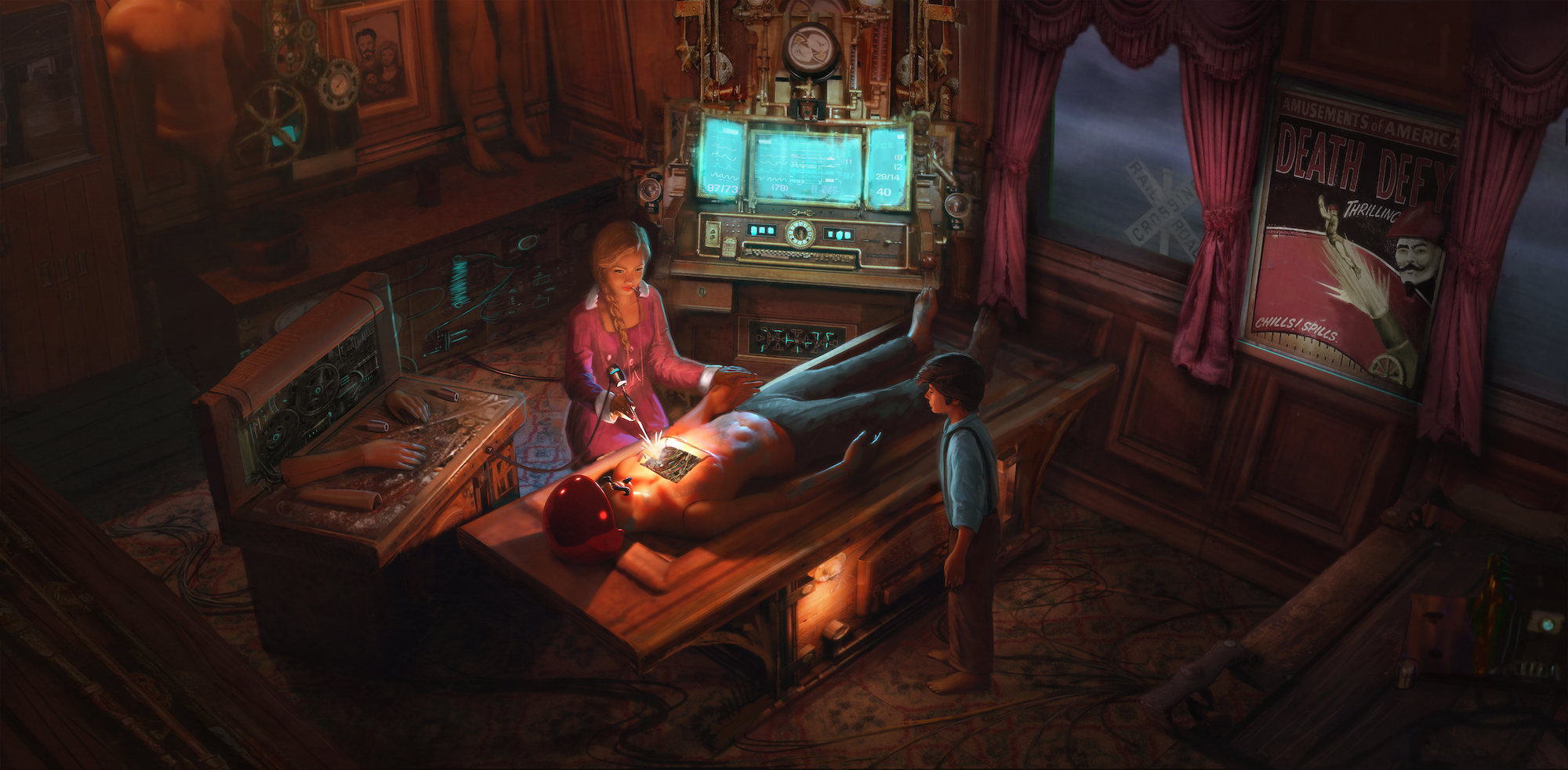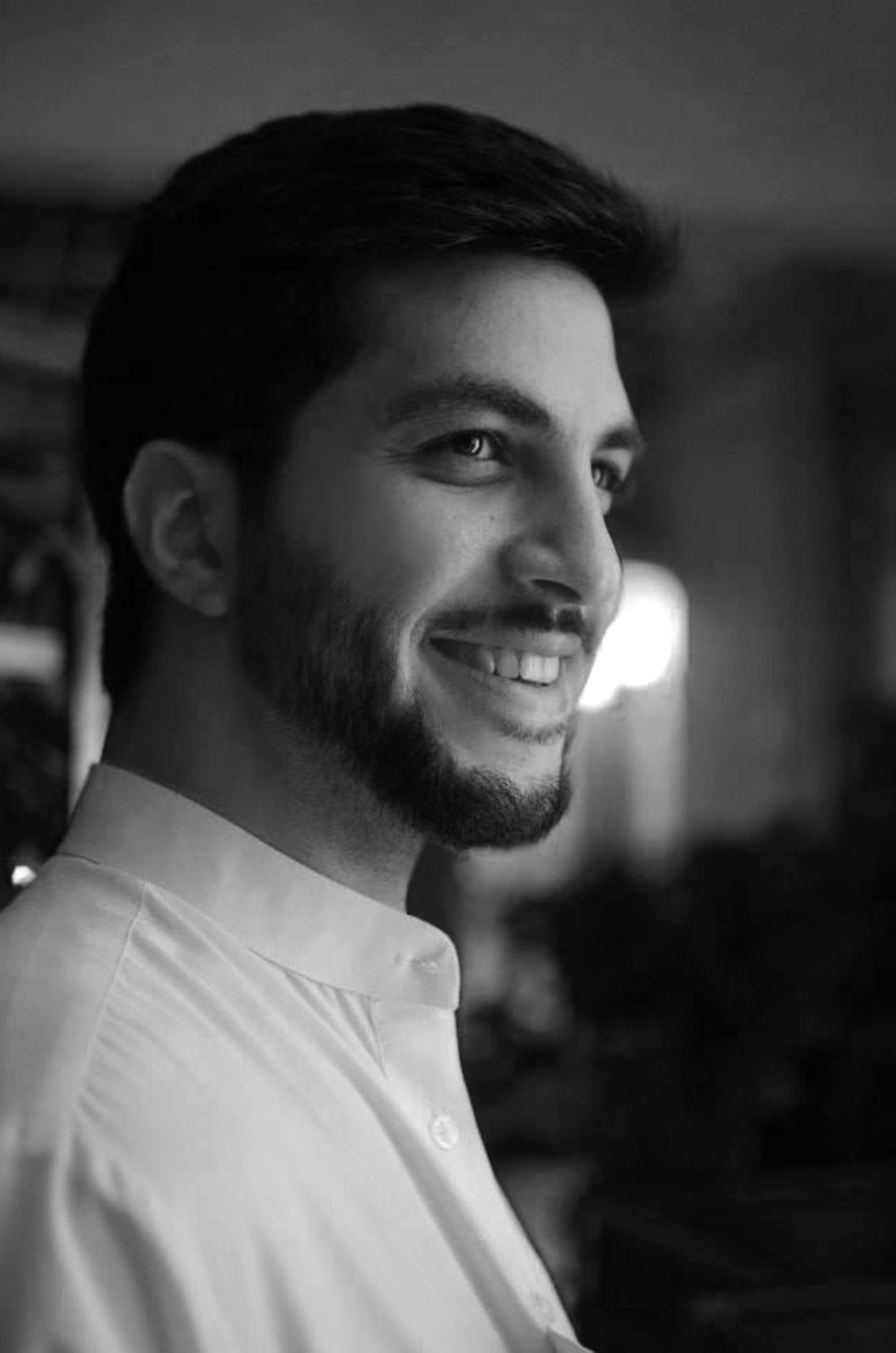Unmended
by Mike Loniewski
Illustrated by Omar Gilani | Edited by Dominik Parisien
Copyedited by Chelle Parker | Selected by Julia Rios
March 2020
My dad is made of metal but you’re not supposed to know. Mom says the people who come to the show would feel cheated if they knew the truth, so I have to stay quiet or it’s money out of our pockets. The metal is hidden just under his skin, but you can feel it if you know the right places to touch. I tap those spots on his arms and chest so I can hear the clinks and the clanks and remember it’s true.
Mom fixes the hard stuff, bones and teeth, with springs and bars and plates all over, to keep the show going. The soft stuff isn’t so easy. Dad’s skin is like the melted wax on the big candle he lights for my birthday. (The candle used to be blue but it’s ugly and pale now, mixed with dirty ash. He’s burned it for me eleven times, and I know he might not light it another time. Dad doesn’t remember much anymore, except for the marks on the ramps he’s supposed to hit.)
Even with all that metal, a piece of dad still breaks every show. He’ll break for good one day. I worry about that.
“Without him, the show closes and we starve,” mom says. “You’ve never had your belly empty. Never had to eat the things I ate.” She never tells me what those things were.
I look at the posters and the marquees with dad’s name in brilliant red letters. “Testify to the darings of Death-Defy!” It’s his stage name, and I know it’s a lie. The pieces of dad, the real pieces, are disappearing and will all be gone soon. My favorite piece already is.
He used to teach me things with that raspy voice he got from a steering rod that went into his throat. But when his jaw shattered and mom replaced it all with a chunk of iron, she sealed up his voice, too.
I was fixing one of the ramps when he said his last thing to me: “I’m counting on you.” I don’t think he meant it for the ramp.
The signs glow and blink and make you see spots in your eyes. People line up around the corner, waiting to see my dad do what Mr. Blanton announces every night on a megaphone as, “Death-Defying dealings in all manners of catastrophe!”
I don’t like Mr. Blanton’s voice. I tell mom this but she tells me to shush. Mr. Blanton pays us because of dad. We have a home on the rails because of him. We ride on his locomotive to different cities, different towns, all of them hot and dusty and red, so that people can give us money for watching dad break.
Mr. Blanton loves when the crowds are big and grumbles when they’re small. No matter the size, he hates the people all the same. “Jagoffs,” he calls them.
Mr. Blanton’s run all kinds of shows and reminds us what happened to the others when they shut down. Contortionists and magicians, sword swallowers and trapeze artists, starving on the streets and doing ugly things for money. Dad is Mr. Blanton’s longest-running show. He needs the crowds and he needs my dad. So do we.
The show is three acts, with jumps off ramps that explode and crashes in cars thrown from roofs. The finale, if dad can make it, is the cannon. Mr. Blanton sets him on fire and blasts him across the arena like a streaking flame into a barrel of water. Sometimes he hits his mark. Sometimes he doesn’t. The crowds like when he doesn’t.
Mom spends all night fixing those metal parts as the train scrapes along the tracks toward the next show. She pulls hard and cranks hard. Sometimes she says bad words. She catches me staring, and she knows what I want to say but never dare would.
“Your father wants this, too,” she says, like she’s spitting the words. “Parents sacrifice for their kids.”
Late into the nights, while the train sways, dad sits in the corner alone, his eyes wide, not blinking. I hold his hand and sometimes it feels like he holds it back.
We watch mom walk to Mr. Blanton’s car. The orange lights in the windows go out and I look at dad and tap the new metal to hear the clinks and the clanks. I put fancy bandages, the ones with cartoons on them, over the fresh, ugly cuts, and I tell him I’m proud of him. He would pull me close when I used to say stuff like that. I think he lost his hearing a while back.
The signs for the arena rip past, and the brakes screech, and we carry the show off of ramps with the sun whipping our backs. I hustle, like dad always taught me. I lay the poles and wrench the platforms together, and I pull with all my weight to make sure every bolt on every board is as tight as he showed me. Dad once said he’ll only fly as high as I let him. I look at the wrench and I pull until I have blisters on my palms.
The crowds stream in, and they’ve got dirty faces and dirty mouths. I buckle dad into his helmet and see my face reflected in chrome.
“I’m counting on you,” I say. I see his hand move. Maybe it’s a twitch, but I see it, and it’s good enough for me.
In Act Two, the car falls from the platform and shatters like glass. It explodes and the crowd roars, hoping dad’s been roasted or, better yet, split in two. I tell myself not to be scared. I tell myself there’s metal in him — metal these stupid “jagoffs” don’t know about, metal that’s gonna save him. But, when he finally crawls out from the wreck, I can’t trick myself. He’s not right and can’t get to his feet. He’s broken, but not like before. There’s nothing to him, like a sack of empty cans falling to the floor. He tries to crawl and the “jagoffs” boo. They boo so loud. They throw things — things that hit dad, things that hurt him.
Dad can’t stand. But I can. I hustle, just like he said to. I jump to the stage, crashing through their hate, their boos, and their bottles, and I stare into dad’s eyes. He reaches out with his broken arm. I raise mine with a fist and fill my lungs. I roar.
“Son of Death-Defy!”
They cheer.
“You’ve got a showman’s spirit, my boy,” whispers Mr. Blanton, carrying me to the cannon on his shoulders like a hero. “Don’t blow it.”
He holds his megaphone and spins some story that’s full of lies to the chanting crowd. Mr. Blanton parades me past them. I can feel their shouting, it’s so loud. They’re reaching for me, and their eyes are huge. Someone just yelled, “Die!”
I see mom push away dad’s hand grabbing at her. He’s scared. I want to yell to him that I’ll be okay, that he can count on me, that I’ll hit my mark and he’ll be proud. But I can’t break the act. I’m part of the show, now.
Instead, I slide down into the dark tube, the cheers echoing into a dull gurgle of metal. I feel the heat of the flames spread across my body and the thunder of the gun. I fly.
I wake up. My body’s wet and my mouth is dry. Mom is here but she won’t look at me. I call her name and she turns away to wipe her hands with a rag stained red.
“Is dad okay?” I ask. “He couldn’t stand. You fixed him?”
She turns around and her eyes are red. She tries to hide her hands.
“He’s counting on you,” she says, “to keep the show going.”
I scream for dad but Mr. Blanton leans in, giving mom a shove.
“They were beggin’ for more,” he says, white paste in the corners of his mouth. “A regular star in the making.”
I look down and see the stitches crawling up my arm like a crusted centipede. I tap them, and I hear the clinks and the clanks.


